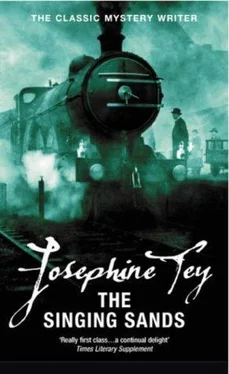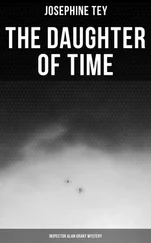He let down the window on his side to its fullest extent. ‘Let me know if you feel that too much,’ he said.
‘You’ve been too long in London,’ she said.
‘How?’
‘Only people who live in towns are fresh-air fiends. Country people like a nice fug as a change from unlimited out-of-doors.’
‘I’ll put it up, if you like,’ he said, although his mouth was stiff with effort as he said the words.
‘No, of course not,’ she said, and began to talk about a car they had ordered.
So the old battle started. The old arguments, the old tricks, the old cajoling. The pointing out of the open windows, the reminding himself that it was only a car and could be stopped at any moment, the willing himself to consider a subject far removed from the present, the self-persuading that he was lucky to be alive at all. But the tide of his panic rose with a slow abominable menace. A black evil tide, scummy and revolting. Now it was round his chest, pressing and holding, so that he could hardly breathe. Now it was up to his throat, feeling round his windpipe, clutching his neck in a pincer embrace. In a moment it would be over his mouth.
‘Lalla, stop!’
‘Stop the car?’ she asked, surprised.
‘Yes.’
She brought the car to a standstill, and he got out on trembling legs and hung over the dry-stone dyke sucking in great mouthfuls of the clean air.
‘Are you feeling ill, Alan?’ she asked anxiously.
‘No, I just wanted to get out of the car.’
‘Oh,’ she said in a relieved tone. ‘Is that all!’
‘Is that all ?’
‘Yes: claustrophobia. I was afraid you were ill.’
‘And you don’t call that being ill?’ he said bitterly.
‘Of course not. I nearly died of terror once, when I was taken to see the Cheddar caves. I had never been in a cave before.’ She had switched off the motor and now she sat down on a roadside boulder with her back half-turned to him. ‘Except those rabbit burrows that we called caves in our youth.’ She held up her cigarette case to him. ‘I’d never been really underground before, and I didn’t mind going in the least. I went all eager and delighted, I was a good half-mile from the entrance when it struck me. I sweated with terror. Do you have it often?’
‘Yes.’
‘Do you know that you’re the only person who still calls me Lalla sometimes? We are getting very old.’
He looked round and down at her, the strain fading from his expression.
‘I didn’t know you had any terrors other than rats.’
‘Oh, yes. I have a fine variety. Everyone has, I think. At least everyone who is not just a clod. I keep placid because I lead a placid life and collect adipose tissue. If I overworked the way you do I’d be a raving maniac. I’d probably have claustrophobia and agoraphobia, and make medical history. One would have the enormous consolation of being something in the Lancet , of course.’
He turned from leaning over the wall and sat down beside her. ‘Look,’ he said, and held out the shaking hand that held his cigarette for her to see.
‘Poor Alan.’
‘Poor Alan indeed,’ he agreed. ‘That came not from being half a mile underground in the dark, but from being a passenger in a car with wide-open windows in an open countryside on a fine Sunday in a free country.’
‘It didn’t, of course.’
‘It didn’t?’
‘It came from four years of consistent overwork and an overgrown conscience. You always were a demon where conscience was concerned. Quite tiresome you could be. Would you rather have a spot of claustrophobia or a stroke?’
‘A stroke?’
‘If you work yourself half to death you have to pay in some manner or other. Would you rather pay in the more usual physical manner with high blood-pressure or a strained heart? It’s better to be scared of being shut into a car than to be pushed about in a bath-chair. At least you have time off from being scared. If you hate the thought of getting back into the car, by the way, I can go on to Scoone with your letter and pick you up on the way back.’
‘Oh, no, I’ll go on.’
‘I thought it was better not to fight it?’
‘Did you scream and yell half a mile underground in the Cheddar Gorge?’
‘No. But I wasn’t a pathological specimen suffering from overwork.’
He smiled suddenly. ‘It’s extraordinary how comforting it is to be called a pathological specimen. Or rather, to be called a pathological specimen in just those tones.’
‘Do you remember the day at Varese when it rained and we went to the museum and saw those specimens in bottles?’
‘Yes; you were sick on the pavement outside.’
‘Well, you were sick when we had sheep’s heart for lunch because you had watched it being stuffed,’ she said instantly.
‘Lalla, darling,’ he said, beginning to laugh, ‘you haven’t grown-up at all.’
‘Well, it’s nice that you can still laugh, even if it’s only at me,’ she said, caught out in that flash of childhood rivalry. ‘Say when you want to go on.’
‘Now.’
‘Now? Are you sure?’
‘Quite sure. Being called a pathological specimen has wonderfully curative qualities, I find.’
‘Well, next time don’t wait until you are on the point of suffocation,’ she said matter-of-factly.
He did not know which he found more reassuring: her awareness that the thing was a sort of suffocation or her matter-of-fact acceptance of unreason.
If Grant had imagined that his chief would be gratified either by the possibility of his earlier recovery or by his punctiliousness in the matter of the newspaper, he was wrong. Bryce was still antagonist rather than colleague. And his reply contained a right-and-left that was typically Bryce. Reading it, Grant thought that only Bryce could manage to have his cake and eat it so successfully. In the first paragraph he rebuked Grant for his unprofessional conduct in abstracting any article from the vicinity of sudden and unexplained death. In the second paragraph he was surprised that Grant should have thought of bothering a busy Department with any matter as trivial as that of the purloined paper, but supposed that no doubt his divorce from workaday surroundings had contributed to a lack of judgement and proportion. There was no third paragraph.
What came off the familiar thin office paper was a strong impression that he had been put, not in his place, but outside. What the letter really said was: ‘I can’t imagine why you, Alan Grant, should be bothering us, either to report on your health or to take an interest in our business. We are not interested in the one and you have no concern with the other.’ He was an outsider. A renegade.
And it was only now, reading the snubbing letter and having the door banged in his face, that he became aware that beyond his conscientious need to put himself straight with the Department over the purloined paper had been the desire to hang on to B Seven. His letter, as well as an apology, had been a way to information. There was no longer hope of obtaining information from the Press. B Seven was not news. Every day people died in trains. There was nothing to interest the lieges in that. As far as the Press was concerned B Seven was dead twice over, once in fact and once as news. But he had wanted to know more about B Seven, and he had hoped without knowing it that his colleagues might be chatty on the subject.
He might have known Bryce better, he thought, tearing up the sheet of paper and dropping it into the wastepaper basket. However, there was always Sergeant Williams, thank Heaven; the faithful Williams. Williams would wonder why someone of his rank and experience should be interested in an unknown dead body seen once for a moment or two, but he would probably put it down to boredom. In any case there would be no lack of chat about Williams. So to Williams he wrote. Would Williams find out what the result of the inquest had been on a young man, Charles Martin, who had died on Thursday night a week ago on the night train to the Highlands; and anything else about the young man that might have transpired in the course of the inquiry. And kind regards to Mrs Williams and Angela and Leonard.
Читать дальше












